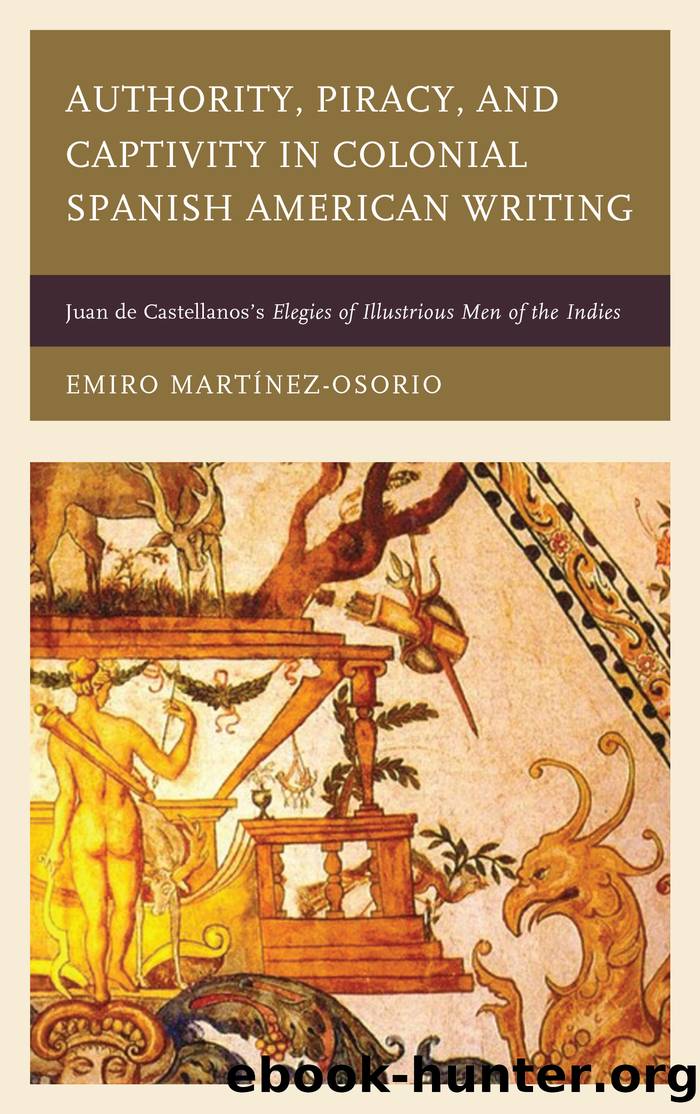Authority, Piracy, and Captivity in Colonial Spanish American Writing by Martínez-Osorio Emiro;

Author:Martínez-Osorio, Emiro;
Language: eng
Format: epub
Tags: undefined
Publisher: Bucknell University Press
Published: 2012-08-15T00:00:00+00:00
Conclusion
It should be clear that Castellanosâs Discurso is a text that portrays the recent maritime history of Spain in the New World as a progression of unpunished affronts by the English and a series of administrative misjudgments on the part of the Spanish Crown and its representatives. To gauge the significance of employing the epic genre to produce this assessment, we need only to remember that while Castellanos emphasized the vulnerabilities of Spanish ports in the New World, courtiers such as Alonso de Ercilla were praising Hapsburg naval dominance and the consolidation of Spanish imperial aspirations by narrating the Battle of Lepanto[57] as a reenactment of the epic battle of Actium inscribed on the Shield of Aeneas described by Virgil in book 8 of the Aeneid.[58]
In his dramatization of the rivalries among the Spanish population residing in the colonies, Castellanos clearly favors the side of the conquistadors and encomenderos. He assumes readers would conclude that if more members of that group were appointed as governors and administrators, problems such as piracy would not arise or would be dealt with appropriately. At face value this argument suggests that Castellanos viewed piracy not only as a result of Spainâs monopoly over intercontinental trade or of Englandâs effort to get a share of the wealth coming from the Indies but also and primarily as a side effect of the Spanish Crownâs policy of appointing favorites, nobles, or university-trained bureaucrats to the most covetous posts in the administration of the New World. Accordingly, at the root of Castellanosâs assessment of English piracy vis-Ã -vis colonial politics is the conviction that by not rewarding the deeds and merits of the first wave of colonists, Philip II was forfeiting his prudence, which was the emblematic attribute of monarchs in the sixteenth century. And prudence, combined with an unwavering âspirit of conquest,â is the main quality that Castellanos and the rest of the colonists from Nueva Granada display in canto 3 in their desire to defend the territory they had usurped from the Muiscas.[59]
This is not to suggest that Castellanos did not attribute any negative traits to Drake as a literary character, which he did, particularly greed, but to highlight the fact that at a time when Drake was still a very controversial figure in England, he selectively excluded the least favorable incidents in Drakeâs career. Castellanos chiseled his description of the English enemy in order to exaggerate Drakeâs talent as a military commander and undermine the abilities of the Spanish administrators who were running the colonies despite their lack of previous military experience. Given that the first two cantos summarize Drakeâs ventures prior to the attack on Cartagena, it is surprising that Castellanos makes only a passing, but favorable, reference to Drakeâs participation in John Hawkinsâs attack on San Juan de Ulúa in 1568. During this attack Drake allegedly abandoned his superior and peers and returned separately to England. According to Harry Kelsey, the charge of desertion âhaunted Drake for the rest of his life, for John
Download
This site does not store any files on its server. We only index and link to content provided by other sites. Please contact the content providers to delete copyright contents if any and email us, we'll remove relevant links or contents immediately.
Half Moon Bay by Jonathan Kellerman & Jesse Kellerman(732)
The Power of Myth by Joseph Campbell & Bill Moyers(724)
A Social History of the Media by Peter Burke & Peter Burke(671)
Inseparable by Emma Donoghue(644)
The Complete Correspondence 1928-1940 by Theodor W. Adorno & Walter Benjamin(546)
The Spike by Mark Humphries;(513)
A Theory of Narrative Drawing by Simon Grennan(506)
Bodies from the Library 3 by Tony Medawar(503)
Ideology by Eagleton Terry;(492)
Culture by Terry Eagleton(490)
World Philology by(477)
Farnsworth's Classical English Rhetoric by Ward Farnsworth(463)
A Reader’s Companion to J. D. Salinger’s The Catcher in the Rye by Peter Beidler(451)
Adam Smith by Jonathan Conlin(448)
Comic Genius: Portraits of Funny People by(431)
High Albania by M. Edith Durham(427)
Game of Thrones and Philosophy by William Irwin(423)
Monkey King by Wu Cheng'en(421)
Early Departures by Justin A. Reynolds(402)
